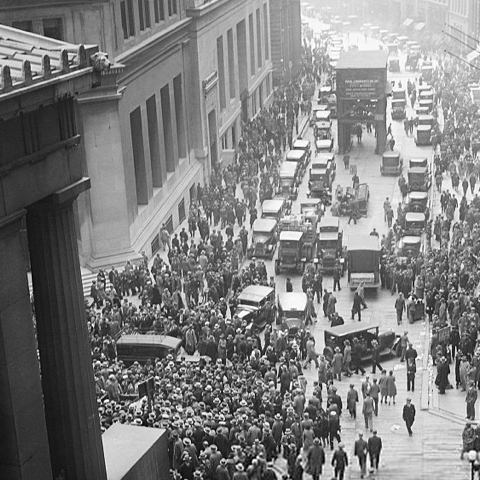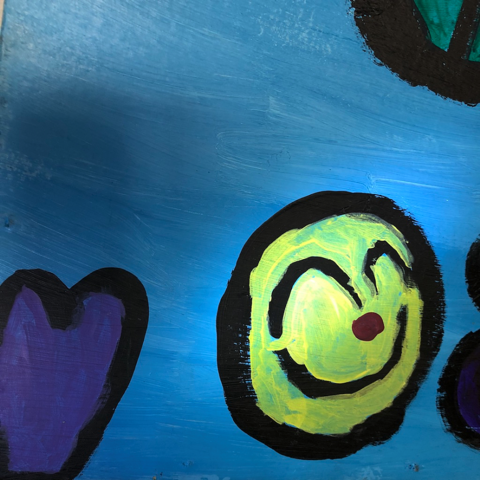Because of things that are swirling—coronavirus and financial markets—I want to interrupt our series on finding our True Selves and go elsewhere.

We learned in US history class that when the stock market crashed in 1929, some people killed themselves. We heard stories of stockbrokers jumping from office windows.
My great-grandfather was one of those people.
He wasn’t a stockbroker, he was the president of the First National Bank of Schuyler, Nebraska. He was the richest man in the biggest house in a small farming community.
I saw the house once. It reminded me of the Wizard of Oz, and the house that fell out of the sky and landed on a witch. Not because of the style or condition of the house, but because of the impression it gave.
My great-grandfather’s house was large and white and two stories tall, with four fluted columns holding up an imposing embellished pediment. It gave the same impression as the Wizard of Oz house—as if it had fallen from the sky and landed in the wrong place, among a crowd of neighbors half its size.
In 1929, if you had money in one of my great-grandfather’s three banks—you lost it.
All of it.
All of it.
As a result, my great-grandfather went from being the richest man in town to, in my father’s words, ‘the town pariah.’
There were many courses of action my great-grandfather could have taken but he chose the one that left him no subsequent actions.
I don’t judge him for this, having had my own boxing matches with thoughts of exit. But I do take a measure of the impact of his decision.
The role of money in his family before he killed himself is a mystery, but I have a sense of what it became after—an object of irrational fear and desire, which led to harmful frugality and excess.
My great-grandfather’s daughter, my grandmother, pregnant with her first child, saved money on medical expenses by seeing a relative who claimed doctoring skills but wasn’t a real doctor. Thanks to the mangling of my uncle’s skull during birth, he arrived brain damaged.
My father, born second, received the benefits of a real doctor and a normal head.
Based on how my father lived, I believe he felt both relieved and guilty. He alternately obsessed over money and spent it lavishly. After inheriting $1.6 million dollars from his brain-damaged brother (equivalent to about $5.7 million today), he was almost out of money when he died.
I wonder if my uncle’s brain and my father’s seductive||destructive relationship with money would have happened if my great-grandfather hadn’t killed himself. I don’t know.
What I do know is that, whether you are warned about a virus or a stock market or both, worry is not a helpful response.
Worry and fear are not automatic.
Worry and fear are a choice.
When the twin towers fell in 2001, I didn’t worry. I missed it. My mind was occupied.
I was out of the country, in a place where I could see the US news for only about ten minutes each day. At the time, I felt cut off. In hindsight, it was a gift.
When the stock market sunk in 2008, I didn’t worry. I missed it. My mind was occupied.
I had been on the road for client work, came home to a dying husband, and didn’t turn on a TV or a computer for several weeks.
I remember the first time I saw the news and heard the newscaster quote the S&P 500 and NASDQ closing values. I checked the screen. I assumed the numbers on the screen were wrong.
After realizing the numbers were right and I was wrong, I felt stupid for not being more in touch. I felt irresponsible for being so distracted. In hindsight, it was a gift.
Now, in 2020, I am not out of the country, I am not grieving. Nothing is pulling me from the news. There is nothing occupying my mind other than what I put into my mind.
I can change what I put into my mind.
After I have done whatever I can do, after I have exercised my agency within my circle of influence and there is nothing more to do about whatever it is that I am worried about, I have a choice about what I do next.
I have been swinging between obsession with the swirl and thinking about other things.
After a few days of swinging, I’ve noticed that thinking about other things feels better, so that’s what I plan to do.
Each morning I read a page from Thich Nhat Hanh’s Your True Home. The entries are numbered, and there is one for each day of the year.
February 28th was the 59th day of the year, so on that day I read entry 59:
Children of the Earth
We are children of the earth. We rely on the earth and the earth relies on us. Whether the earth is beautiful, fresh, and green, or arid and parched, depends on our way of walking. Please touch the earth in mindfulness, with joy and concentration. The earth will heal you, and you will heal the earth.
Thich Nhat Hanh
I have long believed that the earth heals me. I had never thought that I might heal the earth.
So, if you are feeling worried or fearful, here’s something you might try:
- Step away from the screen. Put down the phone. Walk away from email and your news feed.
- Go outside if you can get outside. If not, look out a window.
- Assess the conditions:
- Is the sun still in the sky or has it fallen into the ocean, and daylight has disappeared from the earth forever?
- Is there still ground under our feet and under the feet of our buildings, or has it turned to dust and blown away, blowing everything and all of us away with it?
- Is there still air to breathe or has oxygen turned to steel, with nothing to give?
- Let the earth heal you.
- Bonus points: consider how you may be healing the earth.
- Consider what matters to you, what your heart holds most dear. Consider, and enjoy considering.
- Come out of your considering and do something—something useful, something you enjoy—something that will occupy your mind.
Update
Good news: the new website is up and running. Kudos to Meredith of Greenix Media for the delightful working experience and the happy result.
I believe the new email service provider is also up and running. I’ve tested everything but with technology, well, there can be surprises. I hope this email worked—that you got this post and not the ‘Admiration’ one, and you got it only once. If something went wrong, please let me know.
Chewing the Cud of Good

The young woman who painted this painting looked this happy when she sold it to me. I am thankful I have things to look at that make me happy.